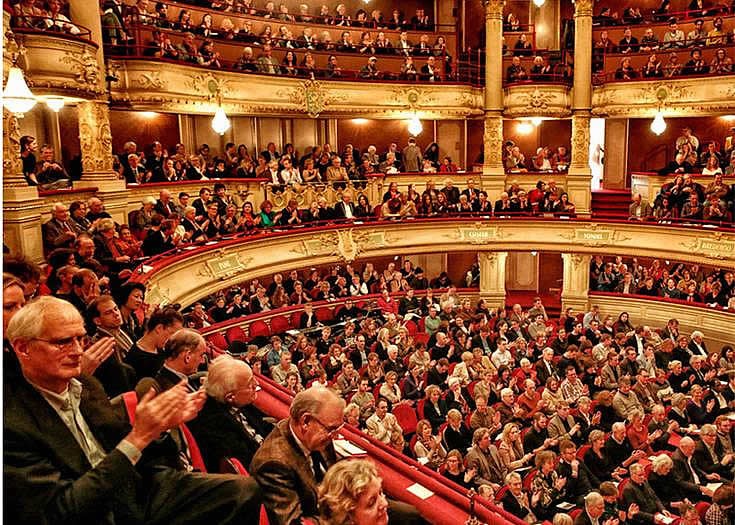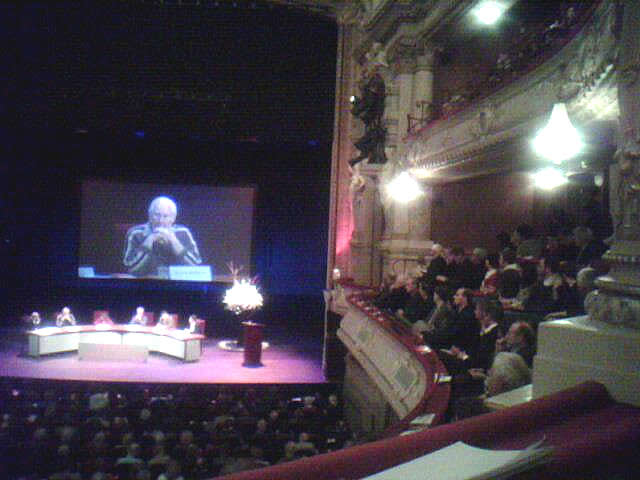The conference began with an understandable opening reading of Badiou, who started to mention the concept of three interacting worlds as a way of looking at reality. Referring Popper, the world can be split into the world of physical objects and events, including biological entities, the world of mental objects and events and the world of objective knowledge.
With regard to events, it is a possiblity to go beyond. In Being and Event, Alain Badiou writes that the event is a multiple which basically does not make sense according to the rules of the "situation," in other words existence. Hence, the event "is not," and therefore, in order for there to be an event, there must be an "intervention" which changes the rules of the situation in order to allow that particular event to be. There is no "one," and everything that is is a "multiple." "One" happens when the situation "counts," or accounts for, acknowledges, or defines something: it "counts it as one." For the event to be counted as one by the situation, or counted in the one of the situation, an intervention needs to decide its belonging to the situation. This is because his definition of the event violates the prohibition against self-belonging (in other words, it is a set-theoretical definition which violates set theory's rules of consistency), thus does not count as extant on its own. |
|
We are living in an interval. Old routines and affairs disappeared or became unusable, but new systems and mechanisms did not occur yet.
Badiou is allergic to the existing world, which in fact does not exist for him, and should not exist. Those who thus inlet adapts, arranges itself, reconciles. Badiou is a Platonist, someone who has great universal ideas in mind, such as universal equality, and measures everything. As long as there is no complete equality in the world, everything is wrong.
Badiou sees it as a betrayal when Social Democrats are governing and want to make improvements in this way. He outlined the impossibility to really influence the global state of affairs. " We have to refer to the individual level. There we can try to 'break' the cause of the existing reality".
He refers to May 1968 and the Arab Spring, events in which the impossible seemed to be possible anyway. Thanks to human creativity. Something new is always a critique on a closed identity, he said. It breaks in the existing. The question is whether it may called 'breaking' and whether it is always about 'criticism'. |
|
Freedom, Badiou says, does not mean that you can do what you want, but using your own creative potential and discipline. Man does'nt find happiness in satisfaction with the existing, but in discovering his creative abilities to change the world. He calls communism the only guiding idea that really goes against the actually existing reality and does off democratic politics as 'nothing more than 'power-theater'. "In fact, everything is decided by a small group of rich and powerful people."
Democracy was treated with scorn by Badiou. Democracy was the real enemy. Badiou, who advocates great revolutionary change, did not know how small he had to make small with his fingers to show how small the changes are that can be applied in a democracy. That utopian great changes of Badiou were a reason for the English pessimist John Gray to express once again his astonishment about how it is possible that people always come up with Great Ideas, while being able to know what misery they have caused. At the same time he had to mirror himself that we are living in a fragile civilization and that mankind has to do with its own ancient evil ('immemorial evils'), 'conflicted animals' as we are. Do not expect rapid changes in the human condition, especially not by all the new technology. This is a new illusion. |

